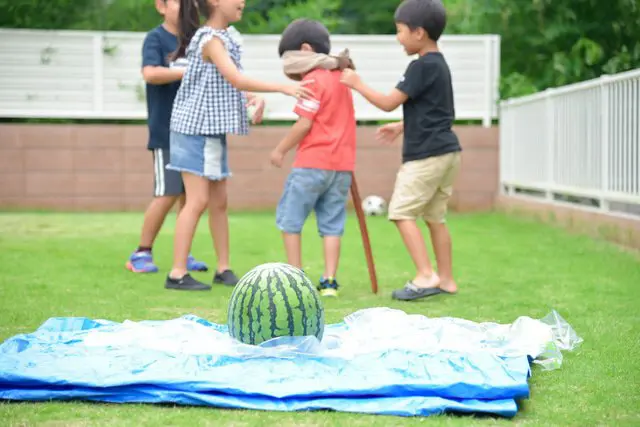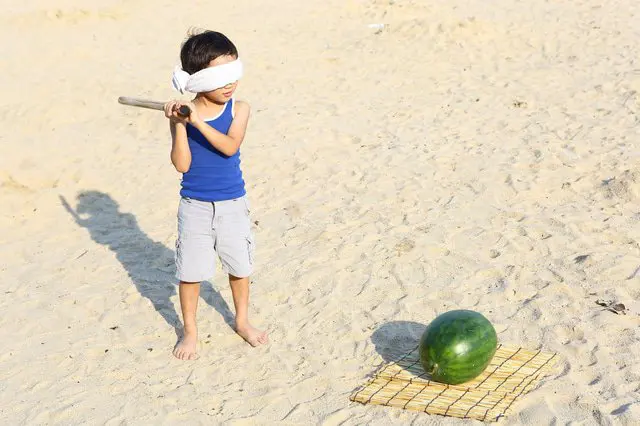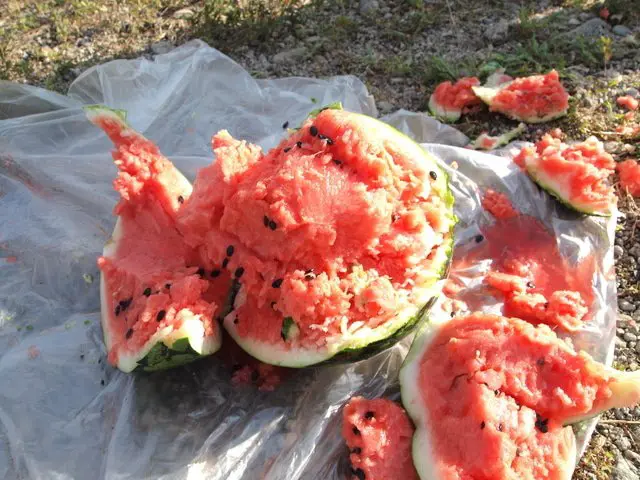Suika Wari (Watermelon Splitting) - Japanese Encyclopedia

One of Japan's favorite summer foods is watermelon. The fruits is used in a pinata-like game called "suika wari" that people play at BBQs and on the beach each summer.
Suika-wari and its History

Watermelon or suika are one of the signature foods of summer in Japan, and suika wari is a traditional summer game. This is how the locals play suika wari: one person stands blindfolded holding a long pole or stick, while the group around them shouts out directions so that they can strike the watermelon with the stick, splitting it in half. It's somewhat similar to play with a pinata.
There are various theories as to the origins of suika wari. It is said that a great historical figure may have started it, other experts say it is similar to a custom performed in Africa in order to pray for an abundant harvest.
The purest form of watermelon grows in the wild in Africa and by taking these original melons and selectively breeding them, ultimately the ones that have been grown in Japan came about. It is generally accepted that the custom of splitting the pure watermelons in prayer was brought to Japan along with watermelons in the first place.
Other theories revolve around Japan's prominent art of sword-drawing, which may have been practiced on the melons. The art of drawing a sword requires one to draw the sword from its scabbard quickly before attacking; it is one of Japan's finest martial arts. To demonstrate the degree of skill involved in this art, practitioners would give performances by drawing and slicing fruits and vegetables; it is believed that the game of suika wari came from this.
How to enjoy Suika Wari

Many Japanese people have fond memories of swimming at the beach, walking in the sand and playing suika wari. However you can play suika wari anywhere you like. For those who can't make it to the beach, any open space with a lawn is just as good. As you have to swing about a rather long pole though, it's a good idea to play suika wari somewhere open and with few people around.
Once you're sure you have enough space, you put the watermelon down then step about 5 meters away. The person who will split the watermelon stands ready with the stick in hand, then is blindfolded and spun about so that they aren't sure where the watermelon is. This makes the game even more difficult and fun.
The people standing around the watermelon shout out directions to the splitter. "Go straight", "just to the right", "a little to the left" and other words of encouragement get the splitter closer to the watermelon. If you're playing a serious game of suika wari, you definitely need the help of your advisors. But if you're just having fun, they might steer the splitter in the wrong direction just because.
What do you do Afterwards?

After the watermelon has been split, everyone takes part in eating it. Since its been split into fan-shaped, bite-sized pieces, the watermelon is easy to eat.
Many people in Japan like to eat watermelon with a little salt on it. By putting salt on it the sweetness of the watermelon comes out even more, making it taste even better. Apparently in Italy, many people eat watermelon with lemon on it as the sourness of the lemon brings out the sweetness of the watermelon in the same way. If you'd like to try watermelon in a different way, by all means give these a try.
It goes without saying that if you simply split the watermelon on the sand or grass, the watermelon will get dirty, which is just a waste of fruit. By placing the watermelon on a plastic sheet or even a piece of cardboard, the pieces will stay clean and edible. And, since it's already broken into pieces and laid out on the sheet, you don't need to worry about any dishes - you can just eat it as is.
And once you're done eating, the rind and seeds can simply be wrapped up in the sheet and disposed of; before heading home make sure that you haven't left a mess behind. If you would like to experience a uniquely Japanese game in the summer, why not get a group of friends together and play suika wari on the beach?
日本への訪日外国人の方が、もっと増えますように!


































![[Yufuin] Yunohira Onsen: A Hidden Gem of Red Lanterns and Ancient Stone Paths](https://resources.matcha-jp.com/resize/720x2000/2026/03/03-260208.webp)
![[30 minutes from Nagoya!] Enjoy Tokoname strawberries at a cafe in Tokoname](https://resources.matcha-jp.com/resize/720x2000/2026/02/20-259382.webp)
![[Fukui Prefecture] Eat, drink, and take home! Enjoy Tsuruga City's gourmet food and souvenirs](https://resources.matcha-jp.com/resize/720x2000/2026/02/12-258491.webp)
![[Experiences] South Osaka & Wakayama Factory Tours|Learn Japanese Craftsmanship Through Hands‑On Experiences](https://resources.matcha-jp.com/resize/720x2000/2025/11/06-249221.webp)
